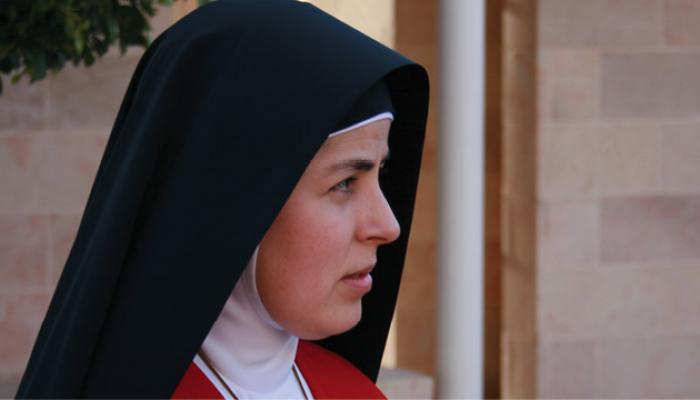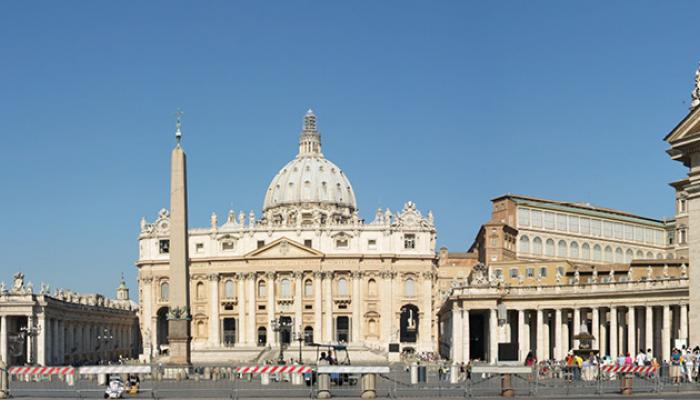
2.9 Çfarë lloj murgjish, murgeshash dhe fretërish ka?
Etërit fetarë (murgjit), vëllezërit (fretërit) dhe motrat (murgeshat) janë njerëz që kanë zgjedhur t’ia kushtojnë veten, jetën dhe pasurinë e tyre Zotit dhe të jetojnë vetëm për Të [> 4.21]. Ata jetojnë sipas një rregulli (monastik) dhe punojnë brenda ose jashtë mureve të manastirit ose kuvendit të tyre.
Shembuj përfshijnë Misionarët e Bamirësisë (kongregacioni i themeluar nga Nënë Tereza), Françeskanët, Jezuitët dhe Klariset. Secili prej këtyre urdhrave ka një qasje të ndryshme. Disa përqendrohen kryesisht te lutja [> 3.5], të tjerët punojnë në shkolla ose spitale [> 4.45], ose kanë marrë detyra të tjera.
Si është formuar populli i Hyjit?
Në Kishë, për caktim hyjnor, janë mbarështuesit e shenjtë që kanë marrë Sakramentin e Urdhrit dhe formojnë hierarkinë e Kishës. Të tjerët quhen laikë. Nga të dy palët vijnë besimtarë, që i kushtohen Hyjit në mënyrë të veçantë me shpalljen e këshillave ungjillore: dëlirësi në celibate, varfëri dhe dëgjesë. [KKKP 178]
Çfarë është jeta e shuguruar?
Është një gjendje jete e njohur nga Kisha. Është një përgjigje e lirë e një thirrjeje të veçantë të Krishtit, me anë të së cilës të shuguruarit i kushtohen krejtësisht Hyjit dhe priren drejt përsosmërisë së dashurisë nën ndikimin e Shpirtit Shenjt. Një shugurim i tillë karakterizohet nga praktikim i këshillave ungjillore. [KKKP 192]
Çfarë i ofron jeta e shuguruar misionit të Kishës?
Jeta e shuguruar merr pjesë në misionin e Kishës nëpërmjet një dhurimi të plotë që u bëhet Krishtit dhe vëllezërve, duke dëshmuar shpresën e Mbretërisë qiellore. [KKKP 193]
How is the one, holy, catholic, and apostolic Church structured?
In the Church there are the laity and clerics (clergy). As children of God, they are of equal dignity. They have equally importance but different tasks. The mission of the laity is to direct the whole world toward the kingdom of God. In addition, there are the ordained ministers (clerics), who have the duties of ecclesiastical governance, teaching, and sanctification. In both states of life, there are Christians who place themselves at God’s disposal in a special way through celibacy, poverty, and obedience (for example, consecrated religious).
Every Christian has the duty to bear witness to the Gospel by his own life. But God walks a special path with each person. Some he sends as laymen, so that they might build up the kingdom of God by their family and occupation in the midst of the world. For this purpose, he bestows on them in Baptism and Confirmation all the necessary gifts of the Holy Spirit. Others he entrusts with the pastoral ministry; they are to govern, teach, and sanctify his people. No one can take this duty upon himself; the lord himself must send him on his way with his divine power through Holy Orders, so that he can act in the place of Christ and administer the sacraments. [Youcat 138]
Why does Jesus want there to be Christians who live their whole lives in poverty, unmarried chastity, and obedience?
God is love. He longs for our love also. One form of loving surrender to God is to live as Jesus did—poor, chaste, and obedient. Someone who lives in this way has head, heart, and hands free for God and neighbor.
In every age individual Christians let themselves be completely taken over by Jesus, so that “for the sake of the kingdom of heaven” (Mt 19:12) they give everything away for God—even such wonderful gifts as their own property, self-determination, and married love. This life according to the evangelical counsels in poverty, chastity, and obedience shows all Christians that the world is not everything. Only an encounter with the divine Bridegroom “face to face” will ultimately make a person happy. [Youcat 145]
Nga fillimet e monasticizmit deri te “bashkësitë e reja” të kohës sonë, çdo formë e jetës së shenjtëruar ka lindur nga thirrja e Shpirtit për ta ndjekur Jezusin siç mëson Ungjilli. Për themeluesit dhe themelueset e ndryshme, Ungjilli ishte rregulli absolut, ndërsa çdo rregull tjetër kishte për qëllim thjesht të ishte një shprehje e Ungjillit dhe një mjet për ta jetuar Ungjillin në mënyrë të plotë ... Betimet e tyre ishin menduar si një shprehje konkrete e kësaj dashurie pasionante. [Papa Françesku, Letër drejtuar të kushtuarve, 21 nëntor 2014]





